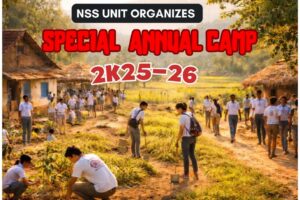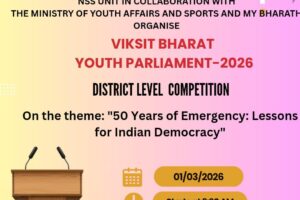
REPORT ON TEACHING AT HUNSUR – AN EXTENSION ACTIVITY FROM THE DEPARTMENT OF ENGLISH (PG), ST PHILOMENA’S COLLEGE, MYSORE
As part of a community outreach and experiential learning initiative, ten postgraduate students of first and second year from PG Department of English,St Philomena’s College (Autonomous) visited St Joseph School, a government high school in Hunsur to participate in a 10-day learning camp organized by Shanthi Gramabhivrudhi Kendra, Udayagiri post, Mysore, in collaboration with the institution. The primary objective of this program was to bridge the gap between theoretical learning and practical community engagement by fostering skills in communication, teaching, and leadership. A key component of this camp included a focused two-day spoken English teaching module for students of grades 7, 8 and 9.
The spoken English segment was designed with the following objectives:
- To improve the students’ confidence in using English in daily conversation.
- To enhance pronunciation, vocabulary, and listening skills.
- To create an interactive and enjoyable environment for language learning.
- To encourage peer learning through group activities and participatory sessions.
- To encourage teaching practices among the PG students.
- To foster interactive ability for the students’ careers.
Planning and Preparation
The postgraduate team, consisting of students from the PG Department of English, meticulously planned the sessions in advance. The curriculum was broken down into bite-sized modules with a focus on:
- Basic conversation skills (greetings, introductions, expressing opinions).
- Role-playing real-life scenarios (marketplace dialogues, classroom conversations, etc.).
- Vocabulary-building games and pronunciation drills.
- Storytelling and listening comprehension exercises.
- Grammar and usage at the basic level.
The materials prepared for the sessions included flashcards, visual aids, vocabulary charts, activity sheets, and audio files for the benefit of the students.
Day 1: 5th April 2025
Introduction and Foundation Building
The first day began with a welcome session led by the Headmistress of the school by celebrating the 118th birthday of Babu Jagjivan Ram, former deputy Prime Minister of India. The postgraduate students of English were introduced, to familiarize themselves with the 7th, 8th and 9th grade participants. An ice-breaking activity by clapping hands and then meditating was conducted to ease the students into speaking English in a safe and encouraging environment.
After the ice-breaker session, the students were divided into groups of 7-8 and sent to respective classrooms to join their pair of tutors. The PG students of English divided themselves into groups of two and assigned themselves to each of the classrooms.
The postgraduate students taught the students parts of grammar, and topics such as Parts of speech, verbs, articles and prepositions, sentence formation, and self-introduction. Students practiced greeting each other in English, introducing themselves and asking simple questions. Role-play activities were incorporated to reinforce learning. The session was held from 10:30 am to 1 pm after which all the participants broke for lunch.


Day 2: 8th April 2025
Interactive Activities and Application
On the second day of the camp, emphasis was placed on applying the knowledge from Day 1 through real-life scenarios and collaborative learning activities. The students began the session by reflecting on the learning based on the previous day and proceeded to the next segment of learning through conversations. The post graduate student tutors prepared themselves with different forms of games and activities to foster fun with learning experience among the students. The students of the school were allotted to their respective tutors as the previous time to engage them with the activities. Students practiced common sentence structures with attention to clarity and accent.




Student Engagement and Response
The high school students responded enthusiastically to the activities. Many, who initially hesitated to speak, gradually gained confidence by participating in group work and games. The interactive and informal teaching approach broke down barriers and created a conducive learning environment.
The engagement was evident in the active participation, laughter, and increasing willingness to attempt English sentences even outside the classroom. Feedback collected through informal interactions revealed that the students enjoyed learning through games and stories, and expressed a desire for more such sessions in the future.
Reflections from Postgraduate Students
There was a reflection session involving the post graduate student tutors and the headmistress of the school regarding the experience of teaching and the response to their teaching on both days. Emphasis was placed on applying the knowledge from Day 1 through real-life scenarios and collaborative learning activities. The postgraduate students found the experience immensely enriching.



Challenges and Recommendations
Some challenges faced by the participants included:
- Varied levels of English proficiency among the students.
- Initial hesitation and lack of exposure from the participants.
- Language barrier for teaching
- To sustain the interest among the learners for more than two hours.
- Monotonous engagement of activities without variation.
Conclusion
In conclusion, the extension activity of teaching spoken English to school students by postgraduate studentswas both impactful and well-received. It offered school students an opportunity to improve their communication skills through structured and interactive sessions, while also allowing the postgraduate participants to apply their pedagogical knowledge in a real-world setting. It not only honed their creative abilities but also allowed a broader perspective of looking at various dimensions in the field of teaching, which can be helpful for their future career endeavours. The initiative highlighted the importance of experiential learning and collaboration between institutions. Based on the positive feedback and observed progress, this activity can be considered a successful model for future outreach and skill development programs.

The post graduate students of English, with the team of students and the school management.



![WhatsApp_Image_2026-02-28_at_3.29.30_PM[1]](https://stphilos.ac.in/wp-content/uploads/2026/02/WhatsApp_Image_2026-02-28_at_3.29.30_PM1-300x200.jpeg)